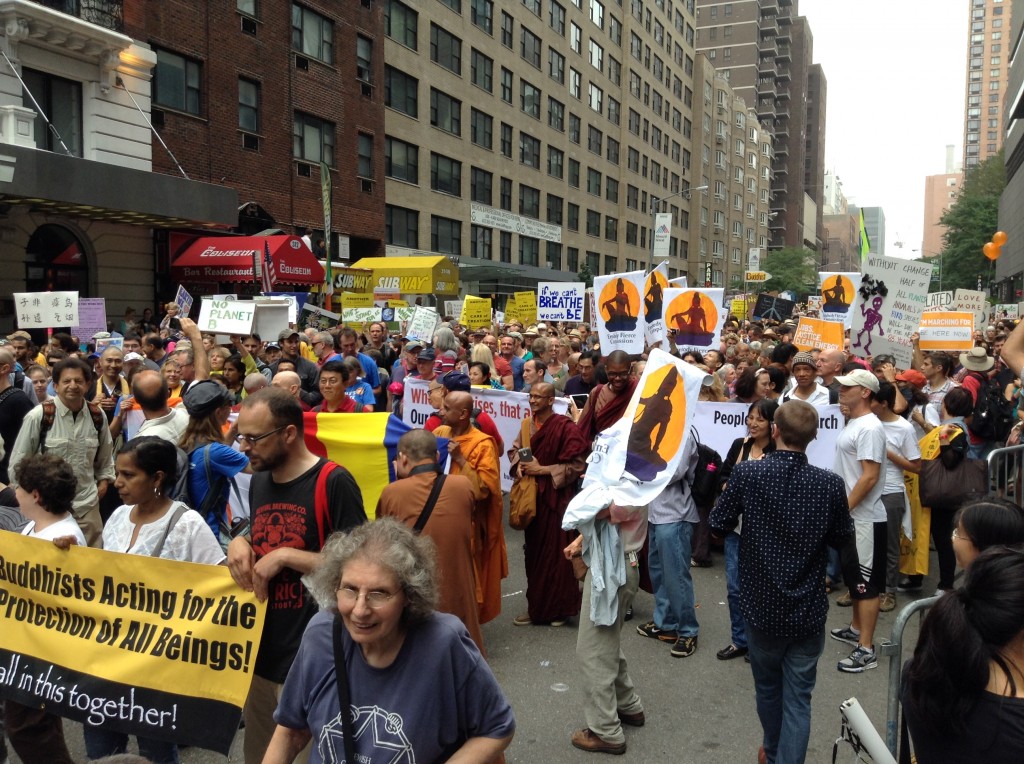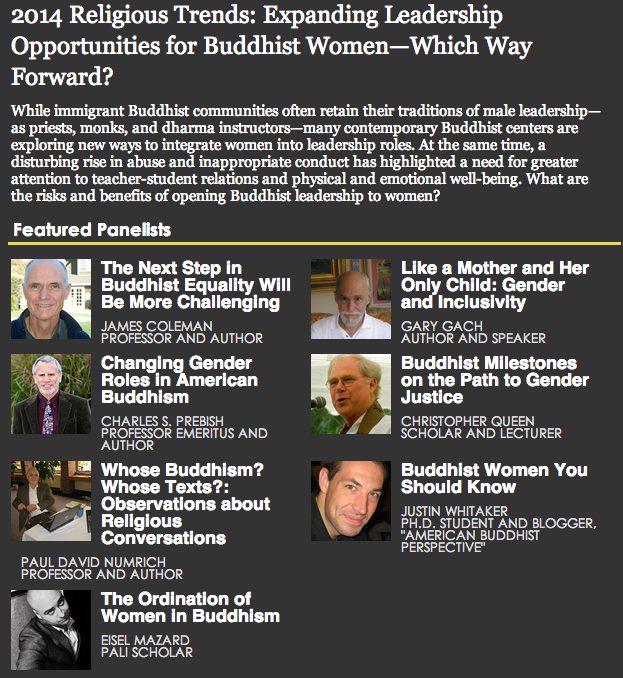 This from the Federation of Australian Buddhist Councils (FABC):
This from the Federation of Australian Buddhist Councils (FABC):
Promoting Gender Equality and Empowering Women is No. 3 on the list of eight declared United Nations (UN) Millennium Development Goals, and is strongly supported by the FABC.
One of Australia’s senior monks, Ajahn Brahm, was invited to deliver a speech on Gender Equality at the UN Day of Vesak Convention in Vietnam in May 2014. Unfortunately, Ajahn Brahm was prevented from delivering his speech by a ban imposed by conference organising committee the day before it was due to be given at the Convention. Ajahn Brahm’s paper had been pre-approved by the conference organising committee several months before the event.
The FABC and Australian Buddhist communities are very disappointed at this missed opportunity to promote the important issue of Gender Equality at an international Buddhist event to celebrate the most important day in the Buddhist calendar. Ajahn Brahm’s paper presented a solid case for the full ordination of women in the Theravadin tradition, supported by references from the Buddha and the Vinaya rules that govern Buddhist monastic life.
You can read the full text of what would have been Ajahn Brahm’s talk on the FABC website here.
New Lotus has more on the incident:
Our reconstruction of events is as follows. Ajahn Brahm’s abstract was accepted on October 7, 2013 by the organizers through a vetting system listed on their website. The draft paper was accepted on November 17, 2013. His final copy was submitted in the middle of January this year. Dr. Dion Peoples, a member of the organizing committee, officially accepted the paper on February 11, 2014. By February 25, Ajahn Brahm had received an official invitation to speak at the conference from Ven. Thich Nhat Tu (Deputy Rector of Vietnam Buddhist University). His registration form to participate in the conference was officially accepted on March 7.
Ajahn Brahm flew to Vietnam overnight on May 7. He was then abruptly informed that his paper was banned by Ven. Thich Nhat Tu and the organizers in the Conference Hall a few minutes before the opening ceremony on May 8, just when the paper was to be delivered the next day. It is strange and unlikely that such a clumsy and abrupt ban was the work of one person. Up until the very last moment on May 8, there was clearly conflict within the International Association of Buddhist Universities.
We do not know who exactly influenced the International Association and lobbied for Ajahn Brahm’s speech to be banned. We reached out to Ven. Thich Nhat Tu, but the organizers were unavailable for comment. So we only have Ajahn Brahm’s word: “I was told by Ven. Thich Nhat Tu that the Vietnamese supported my paper, but the others led by the Thai members on the organizing committee objected. I was told two days later by the Sri Lankan monk, Ven. Dhammaratana, that the Vietnamese objected! The former statement was the most likely.” This indeed seems the most likely explanation, especially given Ajahn Brahm’s rocky history with the Thai lineage of Ajahn Chah. October 2009 was a turning point for his relationship with a section of the Thai sangha after he ordained four women and had to relinquish his membership of the Wat Pa Pong circle of monastaries.
While Ajahn Brahm stressed that it is not helpful to blame individuals, he also made it clear that: “The main point is that it was a United Nations sponsored conference, the theme was the United Nations Millennium Development Goals, the third of which is Gender Equality, and the organizing committee banned any discussion on gender equality in their own backyard, the sangha. That no discussion at all was allowed is the shameful point.”
You can read the rest of the New Lotus commentary here.
I mentioned Ajahn Brahm’s broken relationship with Wat Pa Phong in my dharma talk “Buddhism After Half the Sky“, which you can read here. As I said in that talk:
In the traditions that deny full bhikkshuni ordination to women, reasons are given for the decision. “The tradition died out, and the Vinaya is specific about how to reintroduce it.” “The tradition never reached this country, and, again, the Vinaya is specific about how it has to be introduced.” And so on. At best, these reasons exemplify a lack of critical, historical perspective or sympathy; at worst, they’re excuses, feigned helplessness, we cynically use to hide the truth: that institutional sexism and violence against women are as much a part of Buddhism as any other religion.
The fact is that Ajahn Brahm and others like him are right to do what they did and are continuing to do. More of us need to follow their example. The full inclusion of women cannot wait anymore. Not a second longer. As Mar tin Luther King so famously put it, “The word ‘Wait’ has almost always meant ‘Never.’ We must come to see, with one of our distinguished jurists, that ‘justice too long delayed is justice denied.’” More of us need to challenge — even break — the rules. They are rules that are unjust and promote only the worst in us, never the best. Break the rules if you must. If it’s a choice between promoting equality or oppression, then you’re absolutely right to do it.
As Buddhists we have a choice to make: allegiance to our all-too-human institutions and traditions, or allegiance to that beautifully articulated teaching of the Buddha himself…
As a mother would risk her life to protect her child, her only child, even so should one cultivate a limitless heart with regard to all beings. With good will for the entire cosmos, cultivate a limitless heart: Above, below, & all around, unobstructed, without enmity or hate.
I support Ajahn Brahm, and want to express my disappointment in this awful decision by the conference organizers to block the talk from being heard — a decision that does nothing to “to promote gender equality and empower women” (Millennium Development Goal no. 3), and everything to promote gender inequality and the disempowerment of women.
Fortunately, it looks like Ajahn Brahm is already enjoying the “last laugh,” as it were: as he tells the New Lotus, more people will probably read the talk now that it has been blocked. Make sure you read it too — right here.
[UPDATE: Sanitsuda Ekachai has a strong editorial on this story, with post-coup relevance, in the Bangkok Post this week. – 6/5/14]
[2ND UPDATE: This blog post got a nice shout-out in Buddhadharma: The Practitioner’s Quarterly Online‘s write-up about the incident. Take a look here. – 6/11/14]











